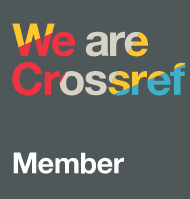The effectiveness of the Team Assisted Individualization model assisted by mathematics domino on mathematics learning outcomes of high school students
Abstract
This study was inspired by the class X SMA Hidayatullah Batam's poor mathematics learning outcomes, one of which was brought on by teaching strategies that discouraged student participation in the learning process. The purpose of this study was to compare the Team Assisted Individualization learning model assisted by mathematics domino (domat) visualizer with conventinal learning models in terms of the mathematics learning results for class X students at SMA Hidayatullah Batam. This kind of research utilized a posttest-only control group design and was quasi-experimental in nature. Up to 53 pupils from class X at SMA Hidayatullah made up the research population. The experimental class, X MIPA PA (15 students), and the control class, X MIPA PI (15 students), were sampled via purposive sampling. The research instrument was in the form of essay questions where all items were valid and reliable (reliability coefficient 0.927 in the high category). Using one sample t-test and independent sample t-tests the data were analyzed. The results showed: (1) The implementation of the domat-assisted TAI learning model was effective in terms of mathematics learning outcomes with a t-value (4.231) > t-table (2.144); (2) the conventional model is ineffective with a t-value (-0.728) ≤ t-table (2.144); and (3) there were differences between the domat-assisted TAI learning model and the conventional model in terms of the outcomes of mathematics learning with a t-value (3.082) > t-table (2.048). On the basis of the study's findings, the domat-assisted TAI learning approach is advised as an alternative to learning mathematics. It can help students take an active part in the learning process and improve their learning outcomes.
Keywords
Full Text:
PDFReferences
Achdiyat, M., & Andriyani. A. (2016). Hasil belajar matematika ditinjau dari model pembelajaran teams assisted individualization (TAI). Jurnal Formatif, 6(3): 246-255.
Afniandari, L. N., Supardi, K. I., & Asikin, M. (2021). Understanding mathematical concepts in the missouri mathematics project learning model in terms of student's independent attitude. Journal of Primary Education, 10(2), 163–178. https://doi.org/10.15294/jpe.v10i2i
Akram, M., Farid, S. & Luqman, M. (2013). An exploration of relationship between perceptual learning styles and achievement goals. International Journal of Business and Behavioural Sciences. 3(1): 27-35.
Ardilla, A., & Hartanto, S. (2017). Faktor yang Mempengaruhi Rendahnya Hasil Belajar Matematika Siswa MTS Iskandar Muda Batam. Pythagoras: Jurnal Program Studi Pendidikan Matematika, 6(2), 175 – 186. DOI: https://doi.org/10.33373/pythagoras.v6i2
Arviana, Azura., Syahrilfuddin., & Antosa, Zariul. (2020). Analisis Penyebab Rendahnya Hasil Belajar Siswa pada Mata Pelajaran Matematika Kelas IVB SD Negeri 147 Pekanbaru. Prossiding Seminar Nasional Pendidikan Guru Sekolah Dasar, 28-34. ISBN: 978-623-91681-0-0.
Ayu, G., & Gusmania, Y. (2018). Pengaruh model pembelajaran kooperatif tipe team assisted individualization terhadap hasil belajar matematika siswa. Dimensi: Jurnal Pendidikan Matematika, 7(2), 246-255. http://dx.doi.org/10.3373/pythagotras.v7i2.1319.
Fauzy, A., & Nurfauziah, P. (2021). Kesulitan pembelajaran daring matematika pada masa pandemi covid- 19 di SMP Muslimin Cililin. Jurnal Cendekia: Jurnal Pendidikan Matematika, 5(1), 551–561. https://doi.org/10.31004/cendekia.v5i1.514
Fritz, A., Haase, V. G., & Rasanen, P. (Eds.). (2019). International Handbook of Mathematical Learning Difficulties. Cham, Switzerland: Springer.
Gunadi, F. (2018). Efektivitas penggunaan media kartu domino untuk mencapai target hasil belajar trigonometri. Mathline: Jurnal Matematika Dan Pendidikan Matematika, 3(1), 89–100. https://doi.org/10.31943/mathline.v3i1.86
Hidayati, I., Deswita, H., & Afri, L. E. (2016). Pengaruh model pembelajaran kooperatif tipe teams assited individualization (TAI) terhadap hasil belajar matematika siswa kelas VII SMP N 3 Ujung Batu, Jurnal Pendidikan Matematika, 2, 1–6.
Islamic, A. R, Sukardjo, J.S., & Nurhayati, N.D. (2016). Penerapan metode pembelajaran team assisted individualization (TAI) dilengkapi media handout untuk peningkatkan prestasi belajar dan interaksi sosial siswa pada materi pokok Tata Nama Senyawa Kimia dan Persamaan Reaksi Kimia Kelas X2 SMA. J Pendidik Kim. 5(2), 68–74.
Khan, BSB., & Salman, R. (2020). Influence of mathematics in our daily lives. Art Human Open Acc J, 4(2), 50‒52. DOI: 10.15406/ahoaj.2020.04.00152
Kholil, M., & Zulviani, S. (2020). Faktor-faktor kesulitan belajar matematika siswa Madrasah Ibtidaiyah Da’watul Falah Kecamatan Tegaldlimo Kabupaten Banyuwangi. EDUCARE: Journal of Primary Education, 1(2), 151-168.
Li, Yeping., & Schoenfeld, A. H. (2019). Problematizing teaching and learning mathematics as “given” in STEM education. International Journal of STEM Education, 6:44, 1-13. https://doi.org/10.1186/s40594-019-0197-9
Marian, F., & Yansyah, M. (2021). Pengaruh penerapan permainan domino terhadap hasil belajar matematika siswa. Jurnal Ilmiah Pendidikan Matematika, 6(1), 14 – 23.
Martyanti, A. (2016). Keefektifan pendekatan problem solving dengan setting STAD dan TAI ditinjau dari prestasi dan self-confidence. Jurnal Riset Pendidikan Matematika, 3(1), 1-15. DOI: 10.21831/jrpm.v3i1.9825.
Mwenda, E., Gitaari., E., Nyaga, G, Muthaa, G, Reche, G. (2013). Factors contributing to students poor performance in mathematics in public secondary schools in Tharaka South District, Kenya. Journal of Education and Practice, 4(7), 93-99.
Nurmala, W., Saharuddin, Tiro, M. A., & Sanusi, W. (2021). The effect of team assisted individualization (TAI) cooperative learning on mathematics learning outcomes. Advances in Social Science, Education and Humanities Research, 611, 57-61.
Ovan., & Nugroho, S. E. (2017). Analisis kemampuan literasi matematika ditinjau dari metakognisi siswa pada Model Pisa-Cps. Unnes Journal of Mathematics Education Research, 6(2): 96- 102.
Panjaitan, D. J., & Indriani. (2020). Media kartu domino untuk meningkatkan minat dan hasil belajar pada materi logaritma. Jurnal MathEducation Nusantara, 3(2), 17-25.
Pardosi, J. B., & Himmi, Nailul. (2018). Efektivitas missouri mathematicts project berbantuan domat terhadap hasil belajar matematika di SMK Tunas Muda Berkarya Batam Tahun Ajaran 2017/2018. Pythagoras: Jurnal Program Studi Pendidikan Matematika, 7(2), 246-255. http://dx.doi.org/10.3373/dmd.v7i2.1690
Qomariyah, A. N., Isnani, I., & Utami, W. B. (2019). The effect of team assisted individualization instructional strategis to enhance problem solving ability, learning activity, and mathematics learning achievement. Jurnal Pendidikan Progresif, 9(1), 6-15. doi: http://dx.doi.org/10.23960/ jpp.v9.i1.201904.
Sari, F.M., & Harini. E. (2015).Hubungan persepsi siswa terhadap mata pelajaran matematika minat belajar dan kemandirian belajar dengan hasil belajar matematika. Jurnal Pendidikan Matematika Union, 3, 61-68.
Subekti, I., Kartana, T. J., & Utami, W. B. (2017). Keefektifan model pembelajaran talking stick terhadap sikap dan prestasi belajar matematika pada materi aritmatika sosial. Jurnal Dialektika Program Studi Pendidikan Matematika, 4(2), 43-49.
Suci, D. W., Firman, F., & Neviyarni, N. (2019). Peningkatan keterampilan berpikir kritis siswa melalui pendekatan realistik di Sekolah Dasar. Jurnal Basicedu, 3(4), 2042– 2049. https://doi.org/10.31004/basicedu.v3i4.229.
Sumini. (2019). Penggunaan media edukatif kartu domino untuk meningkatkan hasil belajar matematika siswa kelas VII.9 MTS Negeri Dumai Tahun Pelajaran 2017/2018. JURNAL PAJAR (Pendidikan dan Pengajaran), 3(1), 182-188. DOI: 10.33578/pjr.v3i1.6829
Sundayana, R. (2013). Media Pembelajaran Matematika. Bandung: Alfabeta.
Vidijanti, F. (2021). The implementation of team assisted individualization model integrated with mathematics project learning. Advances in Social Science, Education and Humanities Research, 611, 34-38.
Wardono & Kurniasih, A.W. (2015). Peningkatan literasi matematika mahasiswa melalui pembelajaran inovatif realistik e-learning edmodo bermuatan karakter cerdas kreatif mandiri. Kreano Jurnal Matematika Kreatif-Inovatif, 6(1), 93-100, DOI: http://dx.doi.org/10.15294/kreano.v6i1.4978
Waritsman, A., & Wutsqa, D. U. (2019). Keefektifan model pembelajaran kooperatif tipe team assisted individualization dengan pendekatan pemecahan masalah. Jurnal Pendidikan dan Kebudayaan, 4(2), 183-196. DOI : 10.24832/jpnk.v4i2.1153.
DOI: https://doi.org/10.33373/chypend.v9i1.5162
Refbacks
- There are currently no refbacks.

This work is licensed under a Creative Commons Attribution-NonCommercial-ShareAlike 4.0 International License.
Copyright (c) 2018 Universitas Riau Kepulauan

Ciptaan disebarluaskan di bawah Lisensi Creative Commons Atribusi 4.0 Internasional.















